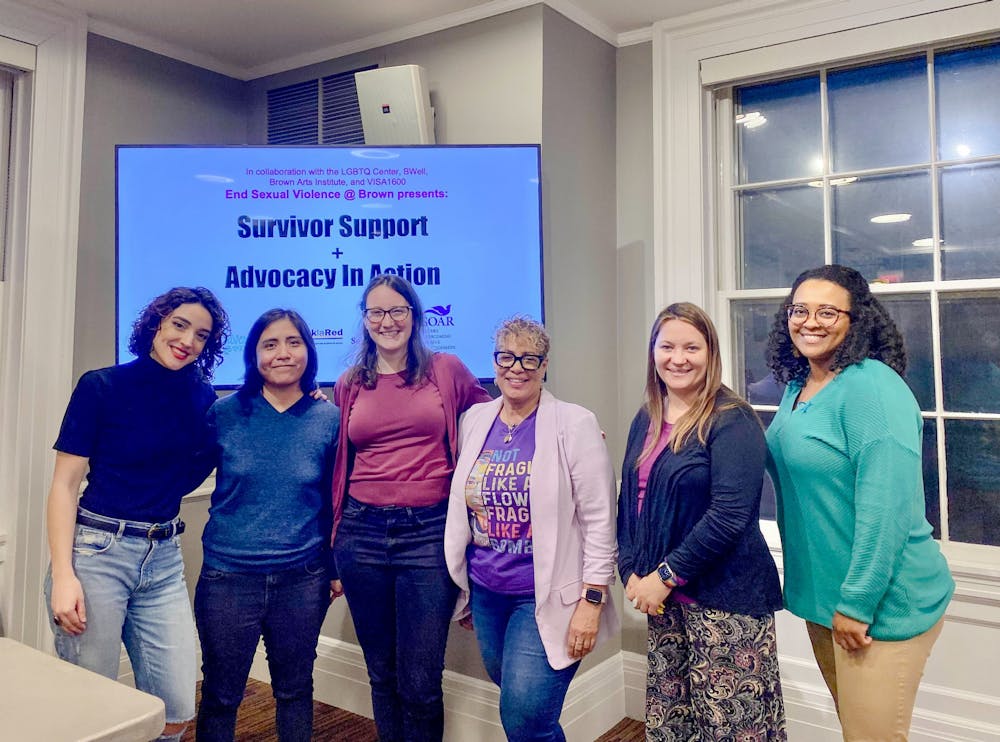Content warning: This article includes references to sexual assault and domestic violence.
Students gathered in the Petteruti Lounge Monday, April 24 to listen to a roundtable discussion hosted by End Sexual Violence at Brown about the best ways to support survivors of domestic and sexual violence. The discussion was organized in collaboration with VISA 1600: “Social Practice: Art in Everyday Life,” the LGBTQ Center, BWell and Brown Arts Institute.
The event featured presentations from Sojourner House, Haven Box, The Network/La Red and the Rhode Island Coalition Against Domestic Violence, followed by smaller group discussions with representatives from each organization.
“'I’m so impressed by the knowledge (of the representatives), what they’ve been doing and the fact that there are so many options for support within the Providence community,” Anna Bencke ’24, a member of ESV, said after the event. “It's really cool to see all these groups that are here that I had no idea existed. I wish we could get this list of resources out to more people.”
The roundtable discussion is one event in a week-long series from ESV — organized by Chloe Chen ’24, Henry Merges ’25 and Haley Sandlow ’25, a current Herald section editor — which sought to shed light on “alternate forms of healing” and amplify survivors’ voices during Sexual Assault Awareness Month, according to Chen.
“We want to think beyond traditional therapy and beyond what resources are offered on campus,” Chen said.
The roundtable addressed “activism, power dynamics and survivorship,” Merges said. “We hope the conversation will really just activate the campus and allow for community dialogue about sexual violence and community building.”
“On college campuses, sexual violence and partner abuse are overwhelmingly common and they’re sometimes not talked about,” Chen said. The “skills that our presenters were sharing are super important for people to know and incorporate into their daily lives.”
The event kicked off with a presentation by Brandie Leach, founder of Haven Box, an organization that provides “comfort boxes” to survivors of sexual violence, according to Leach. “Our items are carefully and compassionately chosen to support the inherent dignity, self-care and recovery of a person after experiencing sexual violence.”
Leach’s presentation focused on “the importance of your initial reaction” to hearing of an instance of sexual assault from a survivor. “We only have one chance to give our initial reaction,” she said. “You want it to be positive, supportive and affirming.”
Lisa Hoopis, director of education and training at Sojourner House, spoke about restorative approaches to the criminal justice system which center survivors’ experiences and well-being.
“When somebody has experienced domestic violence or sexual assault, what happens a lot of the time is they end up blaming themselves and feeling powerless,” she said. “Giving options to the survivor is going to be important … asking what they want.”
Erica Pérez and Loree Drasich, representatives from The Network/La Red, defined various forms of partner abuse and the role consent plays in defining abuse. The survivor-led organization provides support for survivors of domestic violence, particularly those who are members of the LGBTQ+ community.
Claire DeHaven and Zaida Hernandez, representatives from the Rhode Island Coalition Against Domestic Violence, ended the presentation portion of the evening by discussing their roles in Sisters Overcoming Abusive Relationships, a task force within RICADV.
“SOAR is a group of women who have experienced domestic violence and are now working to eliminate domestic violence and also embody the voices of abused women,” DeHaven said. The task force focuses on “healing processes post-domestic violence.”
Hernandez, who joined SOAR in 1997, discussed her own experience as a survivor of domestic violence and how she learned to face her trauma by speaking about it. “I have so much respect for SOAR and the women in SOAR,” she said. “We're not a support group, but we do support one another.”
“All nonprofits were keying in on the idea of power and control and thinking about interlocking systems of oppression,” Chen said after the event. “Sexual violence is not an isolated issue and … all those ‘isms’ — racism, sexism, ableism, everything — need to come down as well.”
In addition to the roundtable event, ESV’s survivor support team also hosted events on the Main Green throughout last week, including an art exhibit on Tuesday, April 25 and a distribution of resources on Wednesday, April 26.
Merges said “that sexual assault and sexual assault awareness is always something that needs to be thought about.” He hopes that ESV’s events gave “survivors restorative and helpful tools to be able to heal, and also to give allies ways to be able to support survivors.”
ESV’s work at Brown
ESV is separated into two branches: survivor support and policy. “It’s based on a dual mission, to both look at prevention of and response to sexual violence,” said Michelle Ding ’25, who leads the group’s policy team.
The event series was run by the survivor support branch, which seeks to establish accessible survivor resources for students, particularly those “who don’t want to go straight to the institution or don’t necessarily want to go straight through to online process or the student conduct process,” Chen said.
“Because we are students ourselves, our primary goal is to be there for student survivors,” she added.
ESV was originally founded as a coalition of on-campus activist groups and grew into its own organization following a student protest in April 2021. Chen emphasized that the initial protests were not “in response to a specific case of sexual violence” but instead aimed to address the broader “pattern of institutional dismissal or neglect that was happening.”
“There are lots of people working at the University that we lean on for their expertise,” Chen said. “There are definitely people at Brown, people hired by Brown, who are really supportive of survivors and who really deeply care about survivors and supporting them.”
But “we want to try to take a nuanced, critical lens to everything that the University does,” she added. “A lot of the people in positions of power at the University are ultimately looking out for the University.”
As a result, Chen said that “survivors often feel like they're being failed by the institution. They often feel like their concerns and their experiences are dismissed by the institution, just to protect the institution.”
The University did not respond to a request for comment.
Chen said that the University also has certain rules that restrict its offices from helping survivors to the fullest extent possible. She cited the Title IX office’s designation as a “neutral office … (that is) not allowed to express preference or support for survivors or perpetrators” as an example.
The Title IX office did not respond to a request for comment by press time.
Merges has noticed “a lot of momentum happening in ESV that we haven't seen in the past year,” and credited events like the roundtable for the spike in energy.
In addition to holding this event series, the survivor support branch of ESV has created a peer support program to connect survivors of sexual violence with “people who can be a resource for them,” Bencke said. “Some people may be looking for a list of resources for where to look for help, and others really just want someone to chat with.”
The policy branch has also led efforts to shed light on information for international students, who Ding said might be “more vulnerable” than students from within the U.S.
“You’re in a completely different country. You’re susceptible to peer pressure. You’re coming from another culture,” she said. “And you don't have emotional support from your family and friends when you're in a different country.”
Ding also hopes to collect more data on sexual violence at Brown. Currently, “it's very difficult to understand what the actual climate is, how many cases there actually are and what exactly students need,” she said.
According to Ding, the members of ESV are all committed to continuing this work, however difficult.
“The thing that keeps motivating students to continue this work is that we all really care about the issue,” Ding said. “And we know there need to be things that are done from a student-led and survivor-centered perspective. And that’s why the organization exists.”

Katie Jain is a University News editor from New Jersey overseeing the graduate student life beat. She is a senior concentrating in International and Public Affairs and History.





